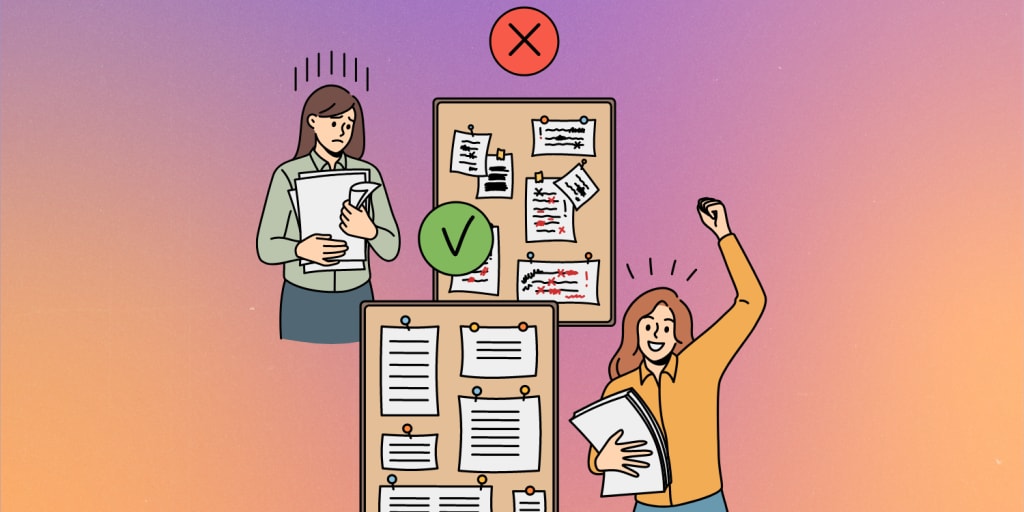Rejection Isn’t A Rite Of Passage For Writers, Describes This Failed Pen-pusher
And from my experience, we’ve enormous problems when we assume it is.

Everyone will tell you that writing rejection is perfectly normal. Expected, if you will. All part and parcel of being a writer.
When starting any business, your mentors, leaders and advice-sharing writers will prepare you for inevitable failure. It’s as predictable as death and taxes.
And it becomes your expectation as soon as you begin pressing your writing career. As I submitted my first novel for consideration with a publishing house, I expected rejection. I knew I couldn’t nail it on my first attempt. That’s now how this worked, right?
No prizes for guessing what happened. Sometimes I wonder why I bothered to submit it in the first place. If I knew it was going to get rejected, I should have thrown it in the bin.
I persisted with the novel. I didn’t receive any feedback from the editor, another expectation set by the industry. Returning to my draft, I blindly edited, cut out characters, and completely overhauled the storyline. I submitted it once again, only for the same rejection. But that was to be expected too.
I submitted seventeen different versions of the same draft, all rejected in the same manner. Zero feedback from the editor, no words of encouragement, not even a hint I was on the right track.
I thought after all these tries, I should have something to work on, a direction from the publishing house. Anything. But alas, I was still at the painful, agonising starting gate.
I turned to my writing colleagues on Facebook and asked them for their thoughts on my rejection.
‘Am I close? Should I keep going? Is this normal?’
All expressed a mutual sentiment. ‘Yes, keep going. You got this.’
But I didn’t have ‘it’. I wasn’t even close. I decided to quit chasing that dream. Seventeen rejections were my limit.
You might be thinking, why did you quit? You might have got it on the eighteenth try. For us writers, rejection is normal, predictable, and something you have to go through.
Whilst I understand why you might think that I beg to differ.
How much time do you have?
A career in writing is far from a get-rich-quick scheme, quick being the operative word.
In truth, there is very little speed in the writing process.
Most editors or publishers demand considerable time investment from you before you even submit your content. They want full articles and manuscripts upon submission.
That comes with the initial writing, then editing, proofreading and formatting based on who you’re submitting to. And, of course, they all have different requirements.
This all takes time. What this means is that before you even pitch your work, you’re in a considerable time debt.
You may measure your debt in hours, weeks, months and even years.
Every minute you add to the debt, you hope it will be repaid to you in the form of getting publishing or earning money from what you’ve written. But as the gap between the time debt and publishing opportunity expands, we assume publishing is imminent.
Yet, the more time you invest into your writing, doesn’t mean you improve the likelihood of publishing. Your time debt does not guarantee that you are getting closer to publishing or earning.
Now, I’ve used conventional book publishing as my example here, but this counts for many other styles of writing and earning. Every facet of writing takes time, and all of them accrue time debt.
The time budget
Time is a valuable commodity. We only have so much of it. If we liken time to money, which for some people is higher in value, we only have so much of a budget to spend.
It’s why I’ve set realistic and sustainable time goals for my writing pursuits. Each project gets its time limit. I try to make these time limits compatible with the type of writing I’m doing. I’m not selling myself short, but I’m not spending time like it’s endless. Balance.
When I hit that time limit, I quit. And move on to the next.
How many years of pursuing this avenue without getting results should we invest? Most people will answer this question with another. ‘How long is a piece of string?’
Well, in my experience, I wouldn’t answer this way. I wouldn’t let you believe there is a right answer. Or lead you to the idea that it’s viable to spend your entire life pursuing this idea.
That’s unrealistic. But how long can you sustain repeating the same mistakes before insanity takes over?
In my experience, it’s never as long as you think.
Stuck on the result and not the number of attempts
If editors publish a writer’s first attempt, what does it say about people who get published on the one-hundredth attempt? Or two-hundredth? Does it mean they weren’t any good at writing?
We have a societal problem with rejection. We’ve learned too many times that adherence to blind patience and sheer perseverance always yields results. Not just in writing.
Thanks to some of the most famous success stories, we’re conditioned to think repeated attempts will get us published. Or make us money as a writer.
Here are some examples:
- J. K. Rowling had the Harry Potter series rejected by twelve different publishing houses before the initial and small first print run. Her rejection rate for this manuscript was 92%.
- Walt Disney tried to sell the concept of Disneyland to three hundred different investors and financiers before landing his golden ticket. His rejection rate for this idea was 99.6%.
- Sylvester Stallone pitched the Rocky script a reported fifteen hundred times before it was developed into a feature film. His rejection rate for his script was 99.9%.
These stories seem to be the rule, not the exception. These stories also lead us to believe that we shouldn’t quit until we reach our goal.
The number of attempts is irrelevant. It’s all about the result.
But this is reality. The number of attempts we make is relevant, more so than we give it credit for. The number of attempts we make to get published is an indicator of what we’ve produced.
Whilst there isn’t a ‘normal’ rejection level, there is an industry understanding when it comes to publishing writing. And I’ve learned this after talking and working with writers and being part of the writing community for over ten years. It is:
Good, profitable writing will be published within the first few attempts.
Whilst there are factors to consider, such as timing, the specific editor and your pitch, quality and sellable writing always trump any moving factors.
There will always be exceptions to the rule. Harry Potter is one of them. But we can’t all be the exception.
If you’re getting rejected more than you’re getting published, if you have a 99% rejection rate, are you cut out to be a writer?
There’s no way other industries would accept a 99% failure rate. You certainly wouldn’t in the medical industry. Why should writers accept this too?
Coming to terms with the limit
I’ve asked myself many times; what is my acceptable rejection rate for my writing before I know this isn’t for me?
That’s a big question, by the way. It’s a bit of a life question because you can’t answer it just like that. I had to feel the rejections. I had to know what rejection did to my motivation, time, and efforts. I couldn’t go into the writing life knowing I had a set amount of rejections.
It does eventually come to you. But when it does, you can’t ignore it.
As a writer, I’ve set the number of rejections I’m willing to endure as a writer. I’ve come up with this number that accounts for keeping my motivation, creativity, and commitment high.
I’ve learned how each rejection depletes all three core ingredients we writers need, so I’ve had to be realistic about my resiliency.
We all have a line about how many pitches we’re willing to endure, much like our time debt. I found my line, and I don’t cross it.
Wearing attempts like a badge of honour is a problem
I don’t dismiss the effort I’ve made. I celebrate how hard I’ve worked and the accomplishment of writing. It’s hard, especially when you’re chasing a big goal. Just having a go is an incredible achievement.
But I’m a big girl, and I know the problems associated with reinforcing a rejection pattern. I’m cementing the idea that I’m not meant to be published. And that it’s less about what I’m creating or how good my writing is (or becoming) and more about how I went about doing it.
I went into writing for people to read my work. I didn’t go into to practise writing and fill my days typing.
We need to think less about the writing craft and more about the writing game. Publishers and editors don’t care, nor do they want to know, how many rejections you have had beforehand.
Your rejections don’t make your writing any more sellable, nor does it improve the quality of what you’ve done.
In fact, your rejections, if told to the wrong people, might prevent you from selling your work. It’s like seeing a product on sale for really cheap; you wonder what’s wrong with it for it to be so cheap.
The same goes for the writing; you’ve had so many rejections; let’s find the reasons why.
Skills, skills, skills
What Rocky, Disney and Harry Potter teach us is lessons in perseverance. If you stick at it, if you don’t give up, if you make a total and unwavering commitment, you will get there.
Yet, it doesn’t always teach us about skills. I shudder to think how bad the Rocky script must have read for it to be rejected so many times. I also wonder how out of touch it was or how unsellable it seemed.
Sometimes, we don’t have the skills of a professional writer. We lack the combination of traits and necessities to convey our thoughts with the written word.
Some people have ideas but cannot articulate themself. Some can execute perfect grammar and spelling yet can’t reconcile an ending to a story that leaves the reader wanting more.
You have it, or you don’t. And that’s something I say to myself more often than not.
At least the rejection improves skills
Rejections told me everything I needed to know about my writing skills. They told me what I wrote wasn’t good enough for the places I was pitching it.
It sounds very defeated when I put it like that. Incredibly negative and hurtful. Yet, I’m not into sugarcoating the reality. I have to do better. I have to improve.
And in case I was wondering, I have proof this is the case. I don’t need to guess. I know.
I’ve never been a fan of people reading my work before it’s ready, but in this rejection process, I’ve seen the importance of feedback. Paying for editors. Paying for proofreading. Getting friends and family to read it and give me feedback, understanding where I’ve gone wrong so I know what skills to improve.
I get it’s not always financially possible to engage in these services. And you might not have the right people in your life to turn to for help. They aren’t the make or break for everyone. Yet, you can’t deny working blind is equally as frustrating and time-taxing.
Financially losing out from rejection
Let’s pretend you own a soup business. You create different flavours of canned soup.
You launch your first soup flavour, it hits the supermarket shelves, and it doesn’t sell. You return to the drawing board and start again. Now the second can of soup is for sale, and it doesn’t sell. If you still have the money to develop a third can of soup, you try again. This can doesn’t sell either.
You now have three varieties of soup you couldn’t sell. You have no money left. And you have an inventory of soup you can’t get rid of or recoup your costs on.
Every business owner knows this is the time to quit. You can’t continue without the money, and your lack of sales is proving this is a bad idea. Or a poorly executed one.
So why do writers continue on their pursuits when they can’t sell their soup? In reality, if you can’t sell your writing, you don’t have a business or a career.
Rejections are a sign you’re not making money. Though it’s not the only reason I went into writing, I’m still a human who needs to pay the bills. I can’t survive off the rejection badge of honour. It won’t put a roof over my head.
The writing business
Here is one of the defining moments of my writing journey and coming to grips with rejection. The idea of business.
The writing I produce is my product, and it’s my job to make it good enough to sell. For me to sell it to a publisher, for me to sell it self-published, for it to sell on the shelves of a store.
This shift in my mindset helped me to take rejection emotion out of the equation. It also helped me better detach myself from my writing and allowed me to edit like the ruthless pro I needed to be.
Crunching like a business owner
Business owners are very target orientated and set themselves tangible, measurable goals regularly. It allows them to gauge if what they’re creating is scalable and profitable. It also allows them to decide what is worth continuing with and what isn’t.
In my opinion, writers need to do a little more of that. Instead of writing the same thing, we should look at it more like a product and quit writing what we can’t sell.
And those targets we know business owners have? Well, writers can set them too. Our metrics could be rejection rates, feedback rates, sales, or earnings from different platforms.
They’re the indicators of our success. Ignoring them because we’re creative and believing “it isn’t about the money” will never get us published.
Pitching like a business
It might not be what you’ve written that is the problem. Though in writing, the work usually speaks for itself. But sometimes, you might miss the mark on the pitching part of the process.
I would love to ask Disney about who he pitched Disneyland to, the type of financiers and who they were. Was he asking the wealthiest man on the street? Or was he asking the second richest man who had a family of three kids?
Your rejections may suggest you’re pitching to the wrong people. Who you pitch your writing to affects the outcome significantly. Be researched about who is publishing the content you’re writing.
You may have the right idea, but you’re trying to sell it to the wrong audience.
I don’t focus on who I’m pitching to as the core reason why I got rejected.
I’ve usually researched this pretty well beforehand. It’s also an easy cop-out to justify the rejection, which means you ignore the million other factors why you were rejected.
It’s sticking your head in the sand, and that never ends well.
Are you stuck on the rejection merry-go-round?
I didn’t tell you the novel I was pitching to was Mills and Boons, the romantic paperbacks found on the dollar shelf at your favourite store.
For a book sold so cheap, Harlequin has stringent expectations for its writers. They also have a process for letting writers know when they were on the right track or not.
It’s all about the feedback. If you receive certain feedback, such as suggested edits, Harlequin is interested in your story. You’re getting close. I never received anything like it, only the generic cut-and-paste response of flat rejection.
In my experience, as you keep submitting to publishers, your feedback from the publisher or editor should change. This is normal for when you’re getting closer to what they want.
If they can see the potential, they will let you know. But if the feedback never comes, you’re always far away from publishing.
When you keep submitting the same type of content and you’re not getting any meaningful feedback and you keep repeating this process, you’re on the merry-go-round.
Somewhere you have to get off and change what you’re doing.
Repeat after me: rejection isn’t normal
Most writers will tell you rejection is normal in the writing world.
Some will go so far as having you believe there is a set number of rejections every person should endure before publication. Rejection comes with learning the trade.
Well, that’s what all the established writers want you to believe. More than likely to make themselves feel better for all the rejections they experienced. And to make some upstart doesn’t come along and prove them wrong.
There is no writer’s rite of passage.
Rejection isn’t compulsory, nor does it necessarily make you a better writer. And whilst there are some benefits from rejection, it’s not a guarantee of the writing process.
When you’re a good writer who produces readable, sellable and enjoyable content, you will get published.
The wrath of rejections isn’t something we come to expect. In fact, we should expect to be successful if we back our work.
And if we aren’t getting success, if we’re experiencing rejections, the writing life probably isn’t for us.
But should you give up? Well, that’s completely up to you.
About the Creator
Ellen "Jelly" McRae
I’m here to use my wins and losses in #relationships as your cautionary tale | Writes 1LD; Cautionary tale #romance fiction | http://www.ellenjellymcrae.com/






Comments
There are no comments for this story
Be the first to respond and start the conversation.